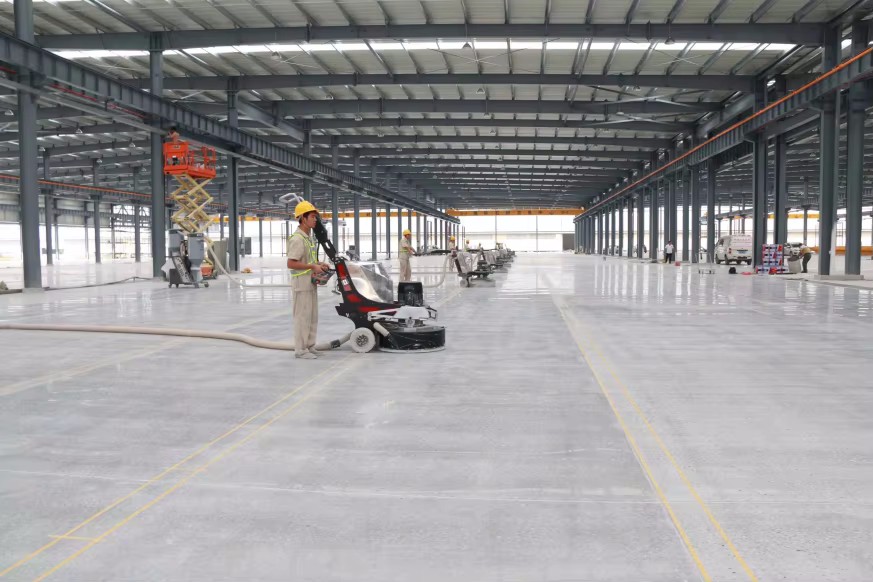Concrete polishing tools can be angle grinders, polishers, floor grinders, diamond polishing pads, etc., and the selection should be based on factors such as the working area and quality requirements.
Concrete polishing is an important construction process aimed at achieving a smooth, flat surface that enhances the appearance and performance of concrete. The right tools are essential for effective polishing as they can significantly affect the quality of the finished surface. This article provides guidance on selecting the right concrete polishing tools based on a variety of factors, including work area and quality requirements.
1. Angle Grinder
An angle grinder is a versatile handheld power tool that plays a vital role in the concrete grinding process, especially for small areas or detailed work. Its ability to use high-speed rotating abrasive discs makes it an effective option for obtaining a smooth concrete surface.
Understand angle grinder
Function
Angle grinders are designed to perform a variety of tasks, including grinding, cutting, and polishing. They are particularly effective when it comes to concrete:
- Grinding small areas: Ideal for corners, edges, and tight spaces that larger machines cannot reach.
- Surface preparation: This can be used to remove surface irregularities, stains, and old coatings before further grinding or polishing.
Benefits of using an angle grinder to cut concrete
- Portability: As a handheld tool, the angle grinder is easy to operate and suitable for both indoor and outdoor projects. Its lightweight design allows for extended use without fatigue.
- Versatility: Angle grinders can be equipped with different types of grinding discs, allowing them to perform a variety of tasks beyond concrete grinding, such as cutting tiles or metal.
- Cost effective: Angle grinders are generally more affordable and better suited for DIY enthusiasts and small contractors than larger grinders.
2. Polisher
Main features
- High-speed operation: The polishing wheel rotates at high speed to achieve efficient polishing and a smooth surface.
- Adjustable settings: Many polishers feature adjustable speed and angle settings, allowing users to tailor the polishing process to the specific requirements of the surface.
Best usage practices
- Stable ground placement: Make sure the polisher is placed on stable ground to prevent vibration from affecting the polishing quality.
- Adjust speed and angle: Before you begin, adjust the speed and angle of the polishing wheel according to the surface condition and desired finish. A lower speed may be suitable for the initial pass, while a higher speed may be used for final polishing.
- Maintain uniform force: During polishing, apply consistent pressure and maintain a steady speed. This practice helps avoid scratches and ensures an even surface shine.
3. Floor Grinder
Floor grinders are heavy-duty machines designed to polish large concrete floors, such as those found in industrial plants and warehouses. They are equipped with powerful motors that remove stains, old coatings, and surface imperfections quickly and efficiently.
Main features
- High-power motor: The floor grinder is driven by a high-power motor, allowing it to handle tough jobs and cover large areas efficiently.
- Multi-function grinding heads: These machines can be equipped with a variety of grinding heads and discs, allowing them to adapt to different surface conditions and polishing requirements.
4. Diamond Polishing Pad
Overview: Diamond polishing pads are essential for achieving a smooth and shiny finish on concrete surfaces. They come in various grain sizes, from coarse to fine.
When to use:
- Use with angle grinder, polisher, or floor grinder.
- Crucial for every stage of the polishing process, from initial grinding to final polish.
Note:
- Choose spacers based on the hardness of the concrete and the desired finish. Coarse pads are used for initial grinding, while finer pads are used for polishing.
- Make sure the pad is compatible with your chosen machine for optimal performance.

Basic Precautions for Concrete Polishing Operations
Preparing the concrete surface
Before starting any concrete polishing operation, the surface must be adequately prepared:
- Dry surface: Make sure the concrete surface is completely dry. Moisture can interfere with the polishing process, causing uneven polish and potential damage to polishing tools.
- Debris removal: Remove any debris, dust, or loose materials from the area. A clean surface allows for better contact between the polishing tool and the concrete, making the polishing process more efficient.
Choose the appropriate grinding head and grinding disc
Selecting the correct grinding head and disc is critical to achieving the desired finish while minimizing wear on the tool and concrete surface:
- Hardness considerations: Evaluate the hardness of concrete. Softer concrete may require different tools than harder surfaces. Using the wrong grinding head can result in excessive wear or poor polishing results.
- Roughness assessment: If the surface is particularly rough, use a coarser abrasive disc to remove imperfections before switching to a finer grit for polishing.
Keep the equipment stable and running smoothly
During the polishing process, maintaining the stability of the equipment is crucial to obtaining high-quality polishing results:
- Stable positioning: Make sure the polisher or grinder is placed on stable ground. Any instability can cause chattering or deflection, which can negatively impact the quality of the polish.
- Smooth operation: Run equipment at consistent speeds and pressures. Sudden changes in speed or force can cause uneven polishing and surface scratches.
Clean up after operation
After completing the polishing operation, the equipment and work area must be cleaned:
- Equipment maintenance: Clean polishing tools and abrasive discs to remove any concrete residue. This practice helps extend the life of the equipment and ensures optimal performance for future use.
- Site cleanup: Remove all dust and debris from the work area to prevent environmental damage and maintain a safe work environment.
In Conclusion
In short, choosing the right concrete polishing tool is the key to completing high-quality polishing operations. By understanding the characteristics and usage of different tools, and selecting and using them in combination with actual operational needs, efficient and safe concrete polishing operations can be achieved.














